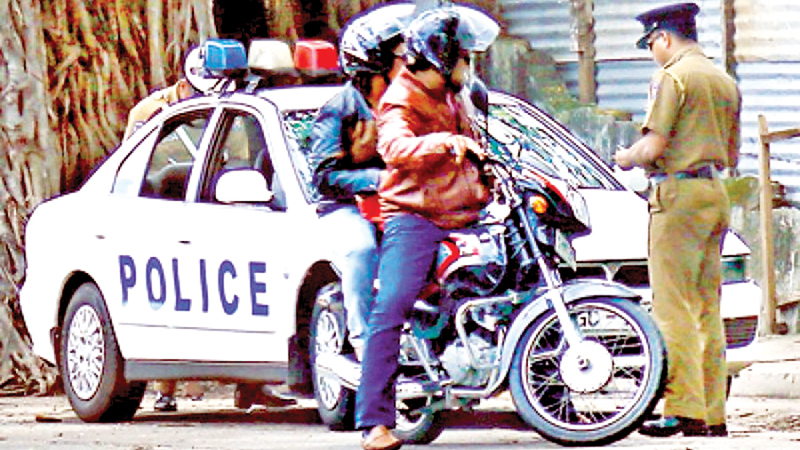 Motorists across the country will soon be able to pay traffic fines through GovPay, the Government’s official digital payment platform, a senior official from the Information and Communication Technology Agency (ICTA) said.
Motorists across the country will soon be able to pay traffic fines through GovPay, the Government’s official digital payment platform, a senior official from the Information and Communication Technology Agency (ICTA) said.
ICTA has completed preliminary work on the traffic fine system and is expected to sign a formal Memorandum of Understanding (MoU) shortly, paving the way for full-scale implementation.
GovPay was launched in February 2025, enabling digital transactions across various Government services. The platform initially integrated services from 16 State institutions, with plans to add 30 more by April 2025. This initiative aims to enhance transparency and reduce inefficiencies associated with cash-based payments.
It was launched to streamline digital transactions for various public services, including payment of taxes, fines, utility bills and education fees in State schools. By eliminating the need for in-person payments at Government offices, the platform aims to enhance efficiency and transparency.
ICTA, which was previously on the verge of closure was revived through a Cabinet decision by the present Government. The newly appointed board to ICTA led by the Chief Advisor to President Anura Kumara Dissanayake on Digital Economy, Dr. Hans Wijayasuriya are in an honorary capacity, demonstrating a commitment to accelerating Sri Lanka’s digital transformation.
The Government now plans to replace ICTA with a new digital institutional framework, ensuring a more streamlined and efficient approach to governance.
The Government intends to fully implement GovPay for traffic fines nationwide this year. The system is being integrated with the Sri Lanka Police’s digital fine database and bank networks, with a pilot phase currently under way in Colombo and select urban areas, said Senior Superintendent of Police (SSP) Manoj Ranagala, Director of Traffic Control and Road Safety. The new digital fine system will replace manual processing, for police officers to issue fines using a handheld device. A unique reference number is generated for each violation, with fine details uploaded instantly to a centralised database. Motorists can check and pay their fines via the GovPay website or app, selecting from various payment methods, including LankaQR, credit cards and mobile banking.
Once the payment is complete, a digital receipt is issued immediately and police records are automatically updated, removing the need for manual verification.
This automated system eliminates the need for motorists to surrender their driving licences at police stations while awaiting fine payments, reducing processing time and the risk of cash-based transactions with officers.
Efforts to implement a digital traffic fine system under the previous Government, led by f0rmer Justice Minister Ali Sabry PC, Transport Minister Pavithra Wanniarchchi, State Minister of Digital Technology Namal Rajapaksa, and Public Security Minister Sarath Weerasekara, did not come to fruition. However, in September 2024, a new initiative emerged when the Cabinet approved a joint venture between Millennium I.T.E.S.P. (Pvt.) Ltd and Metropolitan Technologies (Pvt.) Ltd. This partnership was tasked with developing a consolidated electronic system for collecting fines for traffic offences that do not require court appearances. The system also introduced a negative marking system for drivers who violate traffic laws.
A further step forward was taken in January 2025 with the launch of the e-Traffic mobile application by the Sri Lanka Police. The app allows citizens to report traffic violations in real-time, supporting the ‘Clean Sri Lanka’ initiative aimed at improving road safety and reducing traffic-related incidents.
Despite these advancements, the full implementation of the digital traffic fine system has faced some challenges, such as technical issues, user glitches, and concerns about privacy. Early users of the e-Traffic app reported problems, but the government has worked to resolve these issues. With these setbacks now addressed, the Government plans to roll out the system nationwide later this year, continuing its push to modernise traffic management and enhance road safety.
Digital transformation and the GovPay initiative
GovPay, a major component of the country’s digital transformation, is designed to make the traffic fine payment process faster, more transparent, and resistant to corruption.
Although some challenges remain, the initiative is expected to fully modernise fine collection and enforcement in the coming years.The Government plans to have AI-powered transport and digital governance solutions fully operational by 2027.
The fast-tracking of a National Digital ID system is a key priority, linking an individual’s National Identity Card (NIC), driver’s licence, and bank accounts into a unified digital identity. This will be integrated with GovPay and LankaQR, enabling seamless and secure digital transactions.
To promote a cashless economy, the Government is expanding LankaQR, mobile wallets, and fintech solutions. All Government payments, including welfare programs, will be transitioned to digital platforms, encouraging digital banking adoption across the country.
To boost the country’s technology ecosystem, the Government is introducing tax incentives and grants for local tech startups and software firms. Digital Innovation Hubs will be set up in major cities—Colombo, Kandy, Jaffna, and Galle—to foster AI, blockchain, and fintech development.
Positioning the country as a regional IT and Business Process Outsourcing (BPO) hub is a key economic goal. The Government is seeking investment from global tech giants, such as Google and Microsoft, to develop local AI and cloud computing infrastructure. With these digitisation initiatives, the present administration is set to create a more efficient, transparent, and technology-driven Sri Lanka.
The country is moving away from cash-based economy to digital transactions, which are safer, and faster. The country has expanded LankaQR to public transport, Government offices, and small businesses.
Over two million new users adopted LankaQR in the past six months. LankaQR integrated into public transport ticketing in Colombo and Kandy. Mobile banking and fintech transactions increased by 35 percent since last year. Forty percent of Government services now have an online application process. GovPay platform launched for online fine and bill payments. Work on the National Digital ID is in progress, with a 2026 full rollout target.
Online
The Government is prioritising digitalisation as a key driver of economic recovery and governance efficiency. Major investments have been made in e-Government, fintech, smart transport, AI, and cybersecurity. The success of these projects will depend on execution speed, public adoption, and private sector collaboration.
It invested Rs. 70 billion (about 210 million US dollars) in the country’s digital transformation 2024–2025. It has channelled funding through Budget allocations, foreign investments from the ADB, World Bank, India, China and EU , through Public-Private Partnerships (PPP), Private Tech Companies such as Google, Microsoft, Huawei, SLT, and Dialog.
In a major push towards modernising its transport infrastructure, Sri Lanka is investing Rs. 15 billion (approximately $45 million) in a nationwide smart transport and traffic digitalisation initiative. Spearheaded by the Ministry of Transport, the Department of Motor Traffic, and Sri Lanka Police, the project is expected to enhance efficiency, safety, and convenience through cutting-edge technology.
Meanwhile, the country is set to roll out a full-scale LankaQR-based ticketing system for buses and trains, reducing cash transactions and improving commuter convenience. A smart transport card—similar to Singapore’s EZ-Link—will allow seamless travel payments across multiple modes of transport.
To combat congestion and improve traffic flow, AI-powered smart traffic signals will be introduced in key cities, including Colombo, Kandy, and Galle. Automatic Number Plate Recognition (ANPR) cameras will be deployed to monitor speeding, red light violations, and toll payments. The project is supported by leading Chinese and European technology firms.
The initiative will enable online fine payments through GovPay, integrating directly with police databases. The number of handheld e-fine devices for traffic police will also be expanded to ensure seamless enforcement.
A new digital driving licence featuring a QR code will be introduced, streamlining verification processes. Meanwhile, a blockchain-based vehicle ownership transfer system will enhance security and transparency in registrations. With these advancements, the country is taking a significant step towards a smarter, more efficient public transport and traffic management system. The GovPay platform and Digital Traffic Fine System are set for a major expansion, with upgrades aimed at enhancing efficiency, automation, and accessibility. GovPay will be fully integrated with the Department of Motor Traffic (DMT), Sri Lanka Police, and the court system.
Digital traffic fines
Motorists and drivers will receive instant SMS and app alerts for traffic violations, payment deadlines, and reminders, reducing delays and missed payments. The system will incorporate CCTV and Automatic Number Plate Recognition (ANPR) technology, enabling AI-driven detection of speeding, red light violations, and other infractions, with fines issued automatically.
To accommodate international visitors, GovPay will introduce foreign payment gateways, for tourists and foreign drivers to settle fines via credit cards and global digital payment platforms. A trilingual interface in Sinhala, Tamil, and English will enhance accessibility, ensuring that all users can easily navigate the system.
These enhancements aim to streamline enforcement, improve compliance, and make Sri Lanka’s digital traffic fine system more user-friendly and globally accessible.
The Government is making significant investments in digital transformation to enhance governance, the economy, and public services. While challenges persist, the push for e-governance, fintech, AI-driven transport, and digital education represents a major step forward in modernising Sri Lanka.







